Nagoya University of Commerce & Business
| 名古屋商科大学 | |
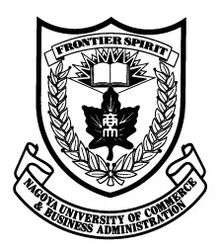 | |
| Motto | Frontier Spirit |
|---|---|
| Type | Private |
| Established | 1935; university from 1953 |
| President | Dr. Hiroshi Kurimoto |
| Students | 3057 |
| Undergraduates | 2601 |
| Postgraduates | 456 |
| Location | Nisshin, Aichi Prefecture, Japan |
| Campus |
Nisshin (Rural) 200 acres (81 ha) Nagoya (Downtown) 17,800 m2 |
| Colors | Green & Gold |
| Affiliations | AACSB and AMBA |
| Website | Nagoya University of Commerce & Business |
 | |


Nagoya University of Commerce & Business (名古屋商科大学 Nagoya shōka daigaku), abbreviated as NUCB, is a Japanese private university located in Nisshin, Aichi within the Tokai region of Japan. The founder of NUCB, Dr. Yuichi Kurimoto, was the first Japanese person graduate from the University of Alberta in 1930. Originally established in March 1935 as the Nagoya Tetsudo Gakko, a vocational railway school, it was later reorganized under the newly formed Kurimoto Educational Institute in 1951.[1]
By 1953, the school was chartered as the Nagoya University of Business and Commerce. The NUCB Graduate School began awarding MBA degrees in 2005. It soon expanded into additional campuses in Tokyo and Osaka. In 2006, NUCB was accredited by AACSB International (AACSB) and later by the Association of MBAs (AMBA) in 2009. Nagoya University of Commerce and Business is the first and only institution in Japan to be accredited by both accreditation boards. NUCB continued the pursuit of its internationalization goals with the grand opening of the Nagoya Marunouchi Campus Tower in downtown Nagoya in June 2015.[2]
History
As one of the first Japanese citizens to study abroad in Canada, Dr. Yuichi Kurimoto enrolled into the University of Alberta in 1926. After graduating in 1930, he returned to Japan with the vision of making education accessible to the disenfranchised youth of the time.[3] Following the post-war economic and population boom in the 1950s, he established the Nagoya University of Commerce and Business.
Frontier Spirit
NUCB was formed under the principles the "Frontier Spirit." As the school motto, Frontier Spirit is defined as the 'spirit of that person who never gives up and who, by acting in an original manner, seeks to benefit humanity, society, and the nation. The fundamental nature of this spirit is this: through diligent endeavor it seeks to know itself and to grow. Independent thinking is its principal tool. This spirit regards the impossible to be possible. It operates on this principle, Where there is a will there is a way. Pioneers are always the founders of a new age. They rely not on others but on themselves alone. They don't borrow other persons' thoughts but trust their own knowledge. They yield to no difficulties. They are persons whose stout hearts and hale constitutions combine to open up new worlds.'[4]
Founding NUCB

As a student in Canada during a time when Canadians themselves were opening up the western frontier, Dr. Kurimoto first adopted the slogan "Frontier Spirit." Returning to Japan with this ideal, he envisioned an educational institution that would 'create leaders rather than followers, to nurture young persons who think creatively and independently and to impact to students the skills and qualities they will need to become pioneers of the future.'[5] In 1953, the Nagoya University of Commerce and Business was officially set up along with the establishment of the Department of Commerce under the Faculty of Commerce.[6]
In 1968 the school was relocated to Nisshin, Japan. The main campus, Nisshin Campus, is approximately 1.5 times the size of Tokyo Disneyland, making it the largest property owned by a private university in Aichi Prefecture. In 1976 the Computer Center opened and followed shortly thereafter by the Central Information Center (CIC) in 1978. The CIC holds over 220,000 books which are available for NUCB students and faculty for research. More than a university library, the CIC allows students to study independently with modern facilities and resources. The center features a Multimedia Room and is equipped with a Self Access Center (SAC). The General Language Education Center was completed in 1981, serving as the base for foreign language education at NUCB. In 1988, the 'Intelligent School' (IS) Building was constructed to increase the capacity of NUCB students and faculty to access information and enable greater communication between them. Equipped with the latest technology for website content, the IS Building houses software and hardware for a wide range of activities related to Internet development and Information Technology.
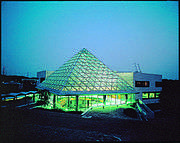
In 1990 NUCB attained government approval to establish the graduate school (NGS) which marked the establishment of Japan's first postgraduate institution in Management Information. Initially, the school offered a two-year, full-time MSc in Management. The NUCB Graduate School was located at the Nisshin Campus until 2001 when it moved to the newly constructed Fushimi Campus in downtown Nagoya. By 1998 various initiatives were launched at NUCB as part of a major internationalization expansion. Guided by the ideals of the Frontier Spirit, these initiatives renewed the mission of NUCB to develop leaders with the ability to bridge the gap between New Asia and the rest of the world. The Faculty of Foreign Languages and Asia Studies was established along with the Frontier Spirit Program - a new study abroad program for Japanese students. NUCB expanded the number of courses related to developing communication skills in English and Information Media, and even included a unique course in psychology that acknowledged the behavioral and cultural challenges of effective international communication.[7] Additionally, the Center for Global Communication (CGC) was established to provide support for Japanese students with international ambitions. Each directive was aimed towards preparing students for a world where effective communication would be essential. Signaling their commitment to adopting modern technology early, the CGC was equipped with state-of-the-art audio/video technology. The construction of the CGC was the final step in NUCB's preparation for the challenge of internationalization and globalization entering into the 21st century.
21st Century
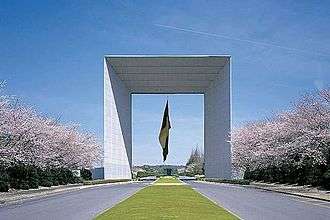
The start of the 21st Century at NUCB was celebrated by the completion of the Millennium Gate at the front entrance of the Nisshin Campus. This was followed by an even greater expansion of the graduate school in terms of the number of departments, degree programs offered, and space. In early 2000, the NUCB Graduate School relocated to a satellite campus in front of Nagoya Station. That same year, Japan's first one-year graduate school in Information Technology was established by the university. In the following year NUCB opened a dedicated graduate school campus at Fushimi, in the heart of the Nagoya financial business district. By 2005 the Graduate School of Management and Graduate School of Accounting and Finance were established. Additionally, the 'Gap Year Program' was implemented to provide students with better opportunities to gain life experiences after enrollment. One of the first of its kind in Japan, NUCB students could spend nearly three months abroad to engage in independent research or volunteer-related activities. Support from NUCB includes scholarships and loans with no interest, as well as conducting seminars on adjusting to life overseas.[8]
Expansion of NUCB continued in 2007 with the opening of the Faculty of Management and in 2008 with the Faculty of Economics and Department of International Studies. The first satellite of the graduate school began in 2005 when the MBA program was launched at the Tokyo Marunouchi Building. In 2007 a campus in Osaka was opened in Umeda, but later relocated in 2013 to the Grand Front Osaka Office Building. The Osaka Umekita Campus of NUCB is much larger than the previous site and was moved to increase the capacity of students enrolled in the university. In June 2015, NUCB celebrated the opening of the Nagoya Marunouchi Campus Tower in downtown Nagoya to provide space for the ongoing domestic and international expansion of the graduate school.
NUCB began receiving recognition for its efforts not only within Japan, but with international accreditation boards as well by the early 2000s. In 2006 NUCB was awarded accreditation from the Association to Advance Collegiate Schools of Business (AACSB) which it successfully maintained after a standard review process in 2013. The university received its second major accreditation in 2009 from the Association of MBAs (AMBA) - the first institution in Japan to be recognized by the board. This dual accreditation has allowed the NUCB graduate school to stand out as the first and only institution in Japan to hold both. In 2011, NUCB was certified by the Japan Institute for Higher Education Evaluation (JIHEE), an organization devoted to recognizing private universities that assist in the enhancement and improvement of the quality of higher education in Japan.
Administration and Organization
Governance
The Kurimoto Educational Institution (学校法人栗本学園 Gakkō hōjin kurimoto gakuen), abbreviated as KEI, is the parent organization of the Nagoya University of Commerce and Business undergraduate and graduate schools. Additionally, the KEI operates an international junior and senior high school located in Showa-ku in Nagoya.
The Nagoya International Junior and Senior High School was founded in 2003. Common to all of the schools directed by the KEI, the mission of the school is to develop a "Frontier Spirit" in its students. The school offers three courses of study - a six-year integrated junior and senior high school program, an International Studies senior high school program, and an Advanced General Studies senior high school program.[9]

Educational Policy
The mission of the Nagoya University of Commerce and Business calls for the development of leaders with the skills required to achieve success in a globalized business environment and bridge the gap between New Asia and the rest of the world. Focusing on business ethics, innovation, and communication in their management practices, NUCB's educational policy is to instill the 'Frontier Spirit' in its students. Providing support services for students is a central pillar in the pursuit of this goal. The organizational structure of the university puts students in close proximity with the administrative staff, in both the Japanese and English-speaking programs. The school is also well known as one of the most accommodating universities, and has been ranked 1st as a private university in the Tokai area and 5th in the country in ranking conducted by University Press in 2015 (unreleased). NUCB is tuned in to the continuously evolving international backdrop that accompanies globalization and offers its students opportunities to participate in overseas exchange programs and experiences. Between 2009 and 2012, 274 students participated in the international volunteer activities.
Undergraduate Program

The undergraduate school is divided into four faculties - the Faculty of Management, Faculty of Economics, Faculty of Commerce, and Faculty of Communication.
- Faculty of Management
- Department of Management
- Department of Management Information Science
- Faculty of Economics
- Department of Policy Management
- Department of Economics
- Faculty of Commerce
- Department of Marketing
- Department of Accounting & Finance
- Faculty of Communication
- Department of Global and Interdisciplinary Studies
- Department of English Studies
Undergraduate Exchange Program
NUCB offers an all English-speaking program through its faculties called the Global Leadership Program (GLP) which is one of the largest English-taught business programs in Japan. As part of the program, students are able to select between twenty and twenty-five courses from various business topics to liberal arts studies including Japanese culture and history. In addition to a core curriculum focused on the perspectives of Asia and Japan, day trips and excursions are conducted throughout the year to enrich the study abroad experience.
Graduate Program
| Graduate School Development | |
|---|---|
| Program/Expansion | |
| NUCB Graduate School | |
| NUCB Fushimi Campus | |
| Division of Global Business Communication | |
| Weekend MBA | |
| Division of Tax Accounting | |
| Division of Management | |
| Tokyo Marunouchi Campus | |
| Osaka Umeda Campus | |
| Osaka Umekita Campus | |
| Nagoya Marunouchi Campus Tower | |
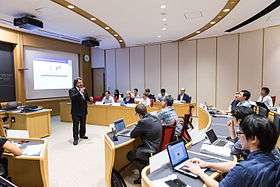
The flagship program of the NUCB Graduate School (NGS) is called 'Weekend MBA', a part-time, weekend-based MBA degree program aimed at working students. The number of students enrolled by 2015 in the graduate school was more than 430, making the NUCB Graduate School one of the largest business schools in Japan. Courses at the NGS follow the case study method, making use of an original case study method based on its own business cases. The school has been recognized for elected as a "Support Program for Distinctive University Education" by the Ministry of Education, Culture, Sports, Science and Technology (MEXT). The Graduate school continuously presses its internationalization efforts for Japanese and English-taught programs, and has been highly ranked by the Eduniversal Best Masters Ranking Worldwide throughout its history.
- Division of Management
- Division of Accounting & Finance
Graduate Exchange Program
The Global Leader Program (GLP) is coordinated by the Division of Management with an all English-taught curriculum for exchange, double degree, and regular students. Involving over thirty different business courses from full-time faculty as well as guest professors from its partner schools, the program utilizes the case study method to facilitate the exchange of diverse student backgrounds and perspectives. Exchange students can enroll for as short as two-months following the four term academic year schedule the program operates under. This is designed to allow students on an exchange program to not only study, but travel across Japan for a well-rounded study abroad experience. The double degree program requires that students spend one year at NUCB and one year at one of their over 100 partner schools. Enrollment of regular students is open to both Japanese and non-Japanese applicants for a one-year or two-year Global MBA degree.
Campuses
Undergraduate School
Nisshin Campus
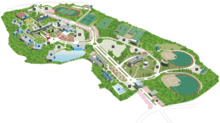
The Nisshin Campus opened in 1968, fifteen years after the formal establishment of NUCB. Nisshin, located just east of the city of Nagoya, sets a rural backdrop for the campus facilities that resembles many American and European university campuses. Visitors are immediately welcomed by the Millennium Gate and massive university flag as they enter the campus. Nisshin Campus houses a central administration office with a Mosburger and 7-Eleven on the ground floor. Nearby, the Community Pavilion hosts space for meetings, dining occasions, and entertaining special guests to the university. Spread out all over the campus, academic buildings include lecture halls, classrooms, and research centers as well as the IS Building, the Center for Global Communications, the Central Information Center, the General Language Education Center, and the International Exchange Center. Furthermore, the campus includes full athletic facilities to support the many sports and clubs at NUCB. These include two baseball fields, seven tennis courts, a soccer pitch, an American football field, an archery range, a pool and gymnasium.
Graduate School
Fushimi Campus
The Fushimi Campus was completed in 2001 as the new location for the graduate school of NUCB. The unique pyramidal design of the downtown campus building reflects the design of IS Building on the Nisshin Campus and stands out from among the typical office buildings and stores in the area. Fushimi was chosen for the site of the NUCB Graduate School because it is recognized as Nagoya's commercial district. The Bank of Tokyo Mitsubishi Nagoya and Bank of Nagoya Head Offices are both located in Fushimi along with other financial institutions and insurance companies. In 2015, all graduate school courses were moved to the newly constructed Nagoya Marunouchi Tower Campus due to the student capacity at Fushimi being reached after only ten years.
Nagoya Marunouchi Tower Campus
Located just a few blocks from the Fushimi Campus, the Nagoya Marunouchi Tower Campus is closer to Nagoya Station and boasts a much greater range of facilities. The fourteen-floor sky-rise holds auditorium style classrooms modelled after Harvard Business School, world-class business suites for professional use, a basement fitness room, and a large hall that holds three hundred at the top floor.
The first two floors of the Marunouchi Tower Campus are designed with a Gothic-inspired theme that resembles a medieval cathedral. The first floor is decorated with a grand piano, fireplace, and fine Italian furniture. The administration office for the NUCB Graduate School is also located entirely on the first floor. In the open space between the first and second floors, 47 national flags are planted to represent each of the countries where NUCB has an institutional partner. Additionally, the second floor holds elegant conference rooms with stained-glass windows. The third floor 'Learning Salon' includes an Italian cafe/bar called Thank You,[10] two private lounges, an alumni lounge, and vending machine. The space is commonly used by both Japanese and international students as a common meeting space to study, relax, and gather before class. The space is also used to hold networking and social events. The fourth floor library holds office space for faculty, the career and case centers, modern video conferencing room, and printing room. The fourth and fifth floors are connected by a central spiral staircase where additional offices for faculty are located. Between the sixth and tenth floors, various styles of auditorium classrooms have been designed to accommodate for multiple lecture types with a capacity of up to 160 students. The tenth floor includes eight breakout rooms and one large classroom whereas the eleventh floor has suite style space for roundtable discussion and video conferencing. The twelfth and thirteenth floors are distinct in having an open table layout with additional breakout rooms that are referred to as 'Idea Rooms.' The fourteenth floor is a large theater room capable of holding business symposiums, graduation ceremonies, and other large-scale events.
| NUCB Nagoya Marunouchi Campus |
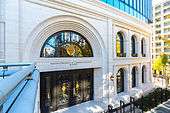 Main Gate of NUCB |
 First Floor Entrance |
 Conference Floor |
Learning Salon |
 Research Center |
Auditorium |
 Large Auditorium |
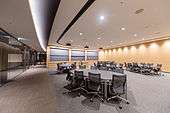 Idea Room |
Theater Hall |
Satellite Campuses
The NUCB Graduate School expanded into Tokyo in 2005 and then in Osaka in 2007. The satellite campus in Tokyo, the NUCB Tokyo Marunouchi Campus is conveniently located just one minute away from the JR Tokyo Station. The Osaka satellite campus originally occupied space in Umeda but was later moved to the Grand Front Osaka Office Building in Umekita which is also just one minute away from the city's major JR train station. Both satellite campuses were chosen for their location in commercial/finance districts for their proximity to major train stations.
Academics
Academic Ranking
Eduniversal Best Masters Ranking 2015[11]
| Category | Program | Japan | Asia | Global |
|---|---|---|---|---|
| Executive MBA & MBA Part-Time | General Manager Program | | | |
| General Management | Business Innovation Program | | | |
| MBA Full Time | Global Leader Program | | | |
| Entrepreneurship | Business Innovation Program | | | |
| Taxation | Tax Accountant Program | | | |
The Nagoya University of Commerce and Business Graduate School has continually been ranked as the top university across all of its programs in Japan. It has maintained strong recognition from Eduniversal since 2010 - being awarded the 'Four Palmes of Excellence' rank which indicates that NUCB is a top business school with strong global influence.[12] In 2015, NUCB was given a Dean's Recommendation Rate of 214% by Eduniversal, putting the university ahead of all but four other Japanese higher education institutions. According to the Best Masters Ranking, a separate list rankings-based list of universities compiled by Eduniversal, NUCB ranks first in all programs in Japan and better than ten in Asia. In 2014, NUCB began to promote itself as "1st in Asia" for business schools.[13] NUCB was also ranked highly by the Asahi Shinbun in their 2015 report on university rankings. Out of 751 higher education institutions in Japan, NUCB was placed at number #41.[14]
Accreditation and Memberships
Accreditations
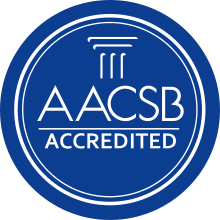

NUCB holds dual accreditation from the AACSB International (AACSB)[15] and the Association of MBAs (AMBA)[16] and is in pursuit of accreditation by EQUIS to become the first higher education institution in Japan to hold the triple accreditation.
Memberships
- Principles for Responsible Management Education (PRME)
- Excellence in Management Development (EMFD)
- Executive MBA Council (EMBAC)
- Association of Asia-Pacific Business Schools (AAPBS)
Institutional Partners
NUCB is active in international exchanges with more than 100 partner business schools from 47 countries around the world including University of Alberta in Canada, Grenoble Ecole de Management in France and Sasin Graduate Institute of Business Administration of Chulalongkorn University in Thailand. The Graduate School also facilitates a study abroad program for executive level students at Harvard Business School, MIT Sloan School of Management and IMD Business School.
Student Life
University Residences
NUCB has three primary residences for international undergraduate and graduate students. The Meito and Chiyoda residences are named after their location in Nagoya while the Global Center is named for its intent to act as a shared living space for international exchange students in the graduate school. The Meito Dormitory was completed in 2011 and has 198 single, fully furnished rooms. Both regular Japanese undergraduate students and exchange students live in Meito. Chiyoda Dormitory is located much closer to the center of Nagoya city, positioned between the Tsurumai and Kamimaezu stations of the Tsurumai Line. Both international and Japanese undergraduates and graduates take residence at Chiyoda while studying at NUCB. Nearby attractions include Tsurumai Park, Osu-Kannon, and the entertainment and shopping district Sakae. The NUCB Global Center is located in the Higashiyama area of Nagoya. The Global Center was specifically designed for international graduate students by NUCB. It completed in 2010 with an elegant, modern Japanese design. The residence facility includes 44 single rooms, a seminar room, library, and fitness center. The Higashiyama Zoo and Botanical Gardens is in the surrounding area of the Global Center.
 NUCB Global Center |
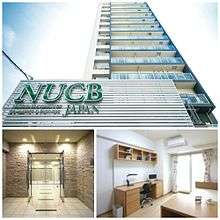 Chiyoda Dormitory |
 Meito Dormitory |
Student Organizations
NUCB has over 50 sports and culture clubs based at the Nisshin Campus. On the day of the matriculation ceremony, these groups set up tables in the center of campus to attract new members. Some of the most popular clubs include baseball, golf, judo and brass band.
Sagamine Festival
The Sagamine Festival is held annually during the third week of October. The event is organized entirely by NUCB students and held at the Nisshin Campus. Activities include a variety of culturally themed booths, entertainment, and performances. Each year famous music artists are invited to perform in a concert held on the first day. On the second day, a talk show is held with a Japanese celebrity acting as the host. Past acts at the Sagamine Festival include Exile (Japanese Band), Funky Monkey Babys, Daigo, and Mari Yaguchi.
On the evening of the final day, the 'Night After Festival' is held. A campfire talk-show is hosted by a different Japanese talento and concludes with a fireworks display. Previous hosts have included comedy duos like Bananaman (comedy duo) and models such as Maggy (model).
Timeline of Key Events
| Year | Nagoya University of Commerce and Business |
|---|---|
| 1935 | Nagoya Railway School established by Yuichi Kurimoto |
| 1950 | Koryo International College established |
| 1953 | Nagoya University of Commerce & Business and Faculty of Commerce |
| 1968 | Campus location gradually moved to Nisshin |
| 1984 | Faculty of Management Information |
| 1985 | Faculty of International Economics |
| 1990 | Graduate School (the first postgraduate institution in Management Information in the country) established |
| 1992 | Established an exchange partnership with the Chinese University of Hong Kong |
| 1993 | Established an exchange partnership with Chulalongkorn University of Kingdom of Thailand |
| 2000 | 1-year postgraduate program in Information Technology |
| 2000 | Satellite campus in front of Nagoya station |
| 2001 | NUCB Fushimi Campus dedicated graduate school campus in front of Fushimi station, Nagoya |
| 2002 | Division of Global Business Communication |
| 2004 | Faculty of Accounting & Finance (Undergraduate School) |
| 2004 | Division of Management |
| 2005 | Global Leader Program - all English MBA Program start |
| 2005 | MBA program launched in Tokyo Marunouchi Building |
| 2006 | Officially accredited by AACSB International as the second institution to be accredited in the country after Keio University |
| 2007 | MBA program launched in Osaka Umeda campus |
| 2008 | Officially accredited by Association of MBAs as the first institution to be accredited in the country |
| 2010 | Global Center was established in Chikusa-ku, Nagoya |
| 2015 | Grand opening of Nagoya Marunouchi Tower campus |
| 2016 | Intown Program developed under the Faculty of Management and Commerce |
Access (Nisshin Campus)
- By taking a bus from Akaike Station (Nagoya City Subway Tsurumai Line) about 27 minutes
- By the school bus from Park West Railway Station (Aichi High-Speed Transit Tobu Kyuryo Line) about 9 minutes
- By foot from Park West Railway Station (Aichi High-Speed Transit Tobu Kyuryo Line) about 50 minutes
- By Meitetsu bus from Komenoki Toyotasen Meitetsu Station (Meitetsu Toyota Line) about 13 minutes
Notes and References
- ↑ "Master Studies; The NUCB Business School". MasterStudies.com. Retrieved February 5, 2016.
- ↑ "Marunouchi Campus Tower; NUCB". NUCB. Retrieved February 5, 2016.
- ↑ "University Description". Eastchance.com. Retrieved February 5, 2016.
- ↑ "The Founding Spirit". NIHS. Retrieved February 7, 2016.
- ↑ "The Founding Spirit". NIHS. Retrieved February 7, 2016.
- ↑ "International Guidebook". www.nucba.ac.jp. Retrieved February 7, 2016.
- ↑ "International Communication Program". Koryo International College of Japan. Retrieved February 7, 2016.
- ↑ "More universities offer 'gap year' programs". The Mainichi. Retrieved February 5, 2016.
- ↑ "School Outline". Nagoya International Junior & Senior High School. Retrieved February 27, 2016.
- ↑ "K-Foods Opens Restaurant in NUCB Marunouchi Tower Campus". K-Foods. Retrieved February 26, 2016.
- ↑ "Eduniversal Best Masters Ranking 2015, NUCB". NUCB. Retrieved February 10, 2016.
- ↑ "Business School Ranking in Japan". Eduniversal. Retrieved February 10, 2016.
- ↑ "Ranked 1st in Asia in worldwide business school ranking". NUCB News. Retrieved February 10, 2016.
- ↑ "Asahi Newspaper University Ranking". Asahi Shinbun. Retrieved February 10, 2016.
- ↑ "Schools in Japan accredited by AACSB". AACSB International. Retrieved February 11, 2016.
- ↑ "NUCB Membership in AMBAs". Association of MBAs. Retrieved February 11, 2016.
External links
Coordinates: 35°09′07.71″N 136°59′41.34″E / 35.1521417°N 136.9948167°E